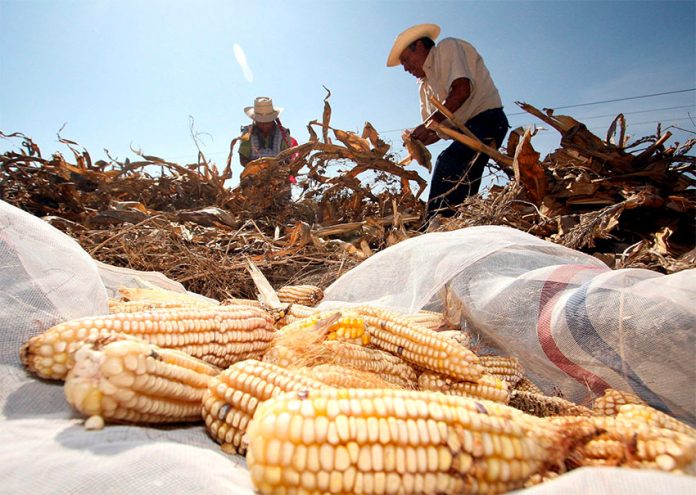With a ban on genetically modified corn imports set to take effect in just over a year, the federal government has begun thinking about ways in which it can ensure Mexico is able to buy enough non-GM corn to meet domestic demand.
President López Obrador published a decree on the last day of 2020 stating that GM corn imports for use in the food industry will be phased out by 2024. Ambiguity in the wording of the decree — which also orders the phasing out of the controversial herbicide glyphosate and GM corn seeds — created uncertainty as to whether imports of GM corn used as livestock feed would also be banned.
Deputy Agriculture Minister Víctor Suárez told the news agency Reuters that the government is proceeding with the ban and no modifications would be made, but didn’t specify whether it would apply to corn used to feed farm animals.
He also said that growing domestic production has put Mexico on track to reduce by 50% imports of yellow corn from the United States — most of which is used as fodder — by the time the ban takes effect. Such a reduction is equivalent to 8.5 million tonnes as Mexico currently imports about 17 million tonnes of corn annually from its northern neighbor.
To secure the corn the country will still need while a gap between domestic production and demand remains, the government will consider making direct agreements with farmers in the United States, Argentina and Brazil to supply Mexico with non-GM corn, he said.
“There are many alternatives to importing non-GM yellow corn from the United States,” Suárez told Reuters earlier this week, suggesting that Mexico’s reliance on U.S.-grown corn will diminish once the ban on GM imports takes effect.
Reuters reported that his remark was “the strongest indication yet” that the GM corn ban will apply to yellow corn used to feed livestock. His statement “appeared to reverse assurances Agriculture Minister Víctor Villalobos made to his U.S. counterpart last year that Mexico would not limit imports of genetically modified corn from the United States,” Reuters added.
Agricultural associations in the United States say that the ban on GM corn imports will cause billions of dollars worth of economic damage both in that country and in Mexico, and have urged the U.S. government to challenge the move under the USMCA, the North American free trade pact.

Suárez asserted that López Obrador’s decree doesn’t violate the USMCA as Mexico is under “no obligation to buy and grow GM corn.”
“We respect and care for [the trade pact], but the USMCA is not God, nor is it our constitution,” he told Reuters.
It remains to be seen whether the government’s plan to get farmers in other countries to grow and supply non-GM corn is viable.
MAIZALL, a coalition of corn farmer associations from Argentina, Brazil and the United States, has said that affiliated growers won’t alter their production methods to accommodate Mexico’s appetite for non-GM corn. The organization — whose members produce 70% of global corn exports, according to the MAIZALL website — said it has doubts about whether Mexico will be able to source enough GM corn to satisfy demand.
Suárez said that the government could make further announcements about its intentions with regard to U.S. corn exports in the second half of next year. He also said that yellow corn imports have become more expensive than locally grown corn and expressed confidence that the dependence on U.S. imports will be halved by the time the ban comes into force.
Federal authorities are seeking to make deals with Mexican farmers to increase yellow corn production to 6 million tonnes a year, the deputy minister said, adding that “we do believe that we will achieve it.”
Government incentives such as free fertilizer and irrigation projects have already helped to slightly boost yields, Reuters reported, noting also that López Obrador is aiming to make Mexico self-sufficient “in everything from energy to food.”
With reports from Reuters
